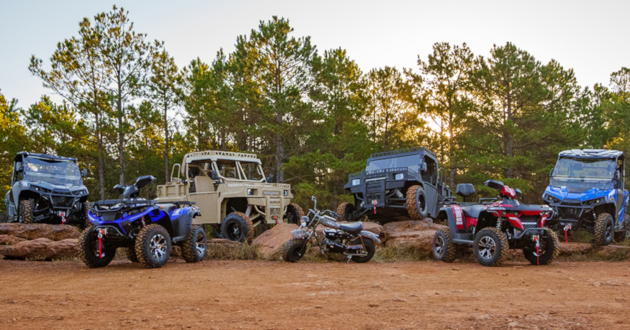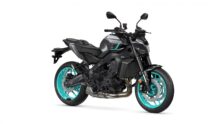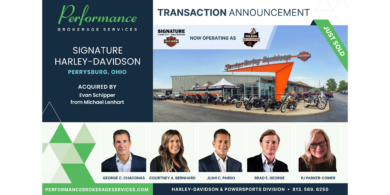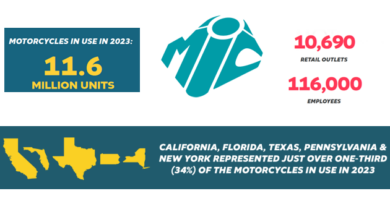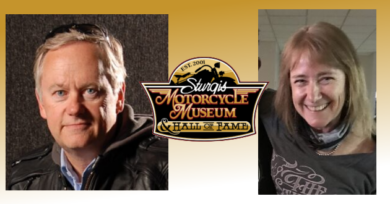September 24, 2007 – Profit sharing rarely used by dealers
By Karin Gelschus
Associate Editor
While few powersports dealerships use profit sharing in the hopes of enhancing employee performance, those that do find it a valuable tool for boosting profits and aiding in employee retention.
As a group, only 16.5 percent of dealers give their employees the option to participate in a profit sharing plan, according to the National Dealer Survey conducted for Powersports Business. The survey, conducted this past summer, touched 500 dealers from across the country.
About 40 percent of companies nationwide offer a profit sharing plan to their employees, according to Auxillium West Human Resources Software, a California-based company that helps small- to mid-sized companies establish HR processes.
Four of the five dealers interviewed for this article that currently have profit sharing plans say they don’t have any plans to drop such programs. The profit sharing plans often can consume a lot of time in refining them to suit each store’s needs, but employees are generally happy with the result.
“Any time you give (employees) money, they’re happy,” said Jeff Penrod, co-owner of Penco Adventures Inc., Kalispell, Mont.
Minimize employee turnover
Reducing employee turnover can save dealerships a lot of time and headaches, which is why Thomas Dowell, owner of Power Sport Stuff Inc. in Wasills, Alaska, offers a profit sharing plan. However, he has modified his program to more of an employee-reward program because his store is not consistently making a profit.
One reason he started the program last year was because he said it’s hard to find good, qualified help. Although he said the program doesn’t necessarily help in recruiting employees, it does help in retention.
Dowell offers a bonus equal to about 1.4 percent of an employee’s gross wages for the previous year to each employee in March if they are still employed with the company. However, Dowell said he hopes to change this to more of an actual profit sharing plan as the company begins to make a profit every year, a difficult task due to the area’s weather conditions. For now, Dowell said the program has worked in minimizing employee turnover.
That hasn’t been the case for Penrod of Penco Adventures, who started a profit sharing plan to reduce employee turnover.
Penrod, who has a larger dealership than Dowell, offers a different type of plan to his employees. The program Penrod uses is set up for a business that employs fewer than 100 people.
“What they earn in their profit sharing goes into an investment company, and then they have the right to invest it the way they want,” he said.
Given that Penrod hasn’t seen improvement in employee turnover and can’t say whether the plan has benefited the dealership, he intends to look into it at the end of the year with his managers and make changes accordingly.
increasing recruitment
Profit sharing plans can be used as an incentive to seal the deal when hiring, according to Jen Williams of Two Jacks Cycle in Kingston, Pa.
Two Jacks Cycle offers a straightforward 401k plan, which holds an option for employees to participate in a profit sharing plan. The plan has been around for about four years.
Although it’s worked for Two Jacks Cycle, other dealers such as Power Sport Stuff haven’t seen the recruiting reward accompany their plans.
“I can’t say it’s helped draw people to the shop,” said Dowell, who has a difficult time drawing applicants because he’s not a franchised dealership.
Although Two Jacks Cycle has seen the benefit of increased recruiting, Williams noted it doesn’t necessarily hook the younger applicants because they aren’t thinking about the savings or the future.
“No matter how much you tell them, they just don’t seem to get it,” she said.
Kyle Asel of Apache Motorsports in Phoenix said his plan doesn’t necessarily lend itself to the entry level person either because it’s tougher for them to see the advantage in it.
More profit?
After establishing a profit sharing plan, it often takes time and adjustments before the plan actually brings in additional profits for the dealership. In order to do that, dealers say every store has to find the right plan for itself, otherwise the plan can and often times will create chaos and possibly even reduce the dealership’s overall profits.
Harry Divins of Trenton Worldclass Harley-Davidson in Trenton, N.J., said last year he paid a flat commission to his sales staff.
“I paid out commissions but didn’t make the money I expected to make,” he said.
To overcome the under producing numbers, he changed his plan. Now the sales department has to make a net profit of at least 5 percent, and if it does, his employees make 3 of the 5 percent. To make it fair among his employees, he divides it up based on the number of hours they work.
“This way they can do what they want, but they won’t get any money if they don’t hit that mark,” he said.
Divins plans on sticking with the plan, although he will refine it in March when he does payroll.
Asel of Apache Motorsports has a similar plan, but he says it can create an unbalance between departments.
“The parts and service guys aren’t making a lion share of the money like in sales and the finance parts of the company,” he noted. Even though the departments are far from equal, Asel said the profit-sharing plan has been beneficial to the company.
Higher satisfaction
Since the profit sharing plans are generating generally positive responses, the interviewed dealers intend to continue with the plans. However, most expect to refine them within the next year in hopes of seeing more rewards that other dealerships are seeing.
“We keep playing around trying to do whatever it takes to motivate people,” Williams said.
But the playing around with the plans comes with a cost. “It takes so much of your time and effort to administrate this stuff,” Penrod said. “In a dealership, I’ve got 100 hats I’m wearing in here.”
Still, Penrod noted that until the dealer can pinpoint what his employees perceive as valuable, dealerships can’t increase morale without such plans.
“Employees are funny because if you keep the appreciation factor high, it makes them feel good and do a good job,” he said.
Divins of Trenton Worldclass Harley-Davidson strongly believes in rewarding his employees for their hard work and strong sales numbers reached, and a profit sharing plan is a good way to do that.
“I don’t know anyone who is working for fun,” he said.

